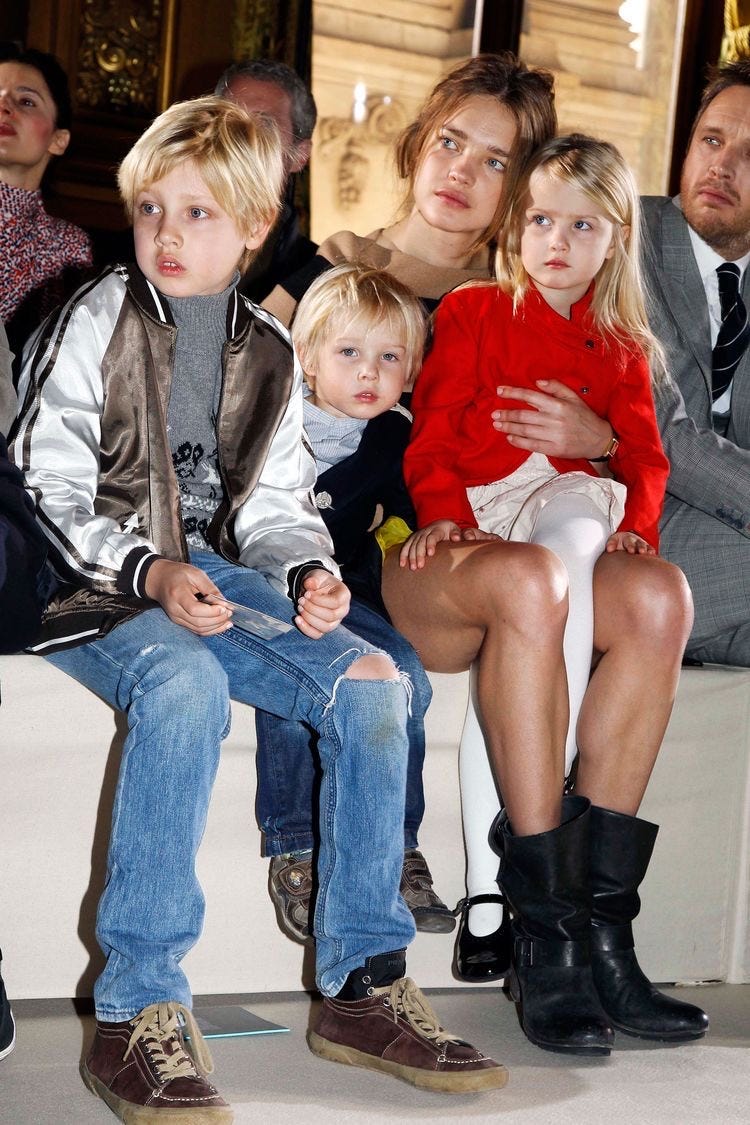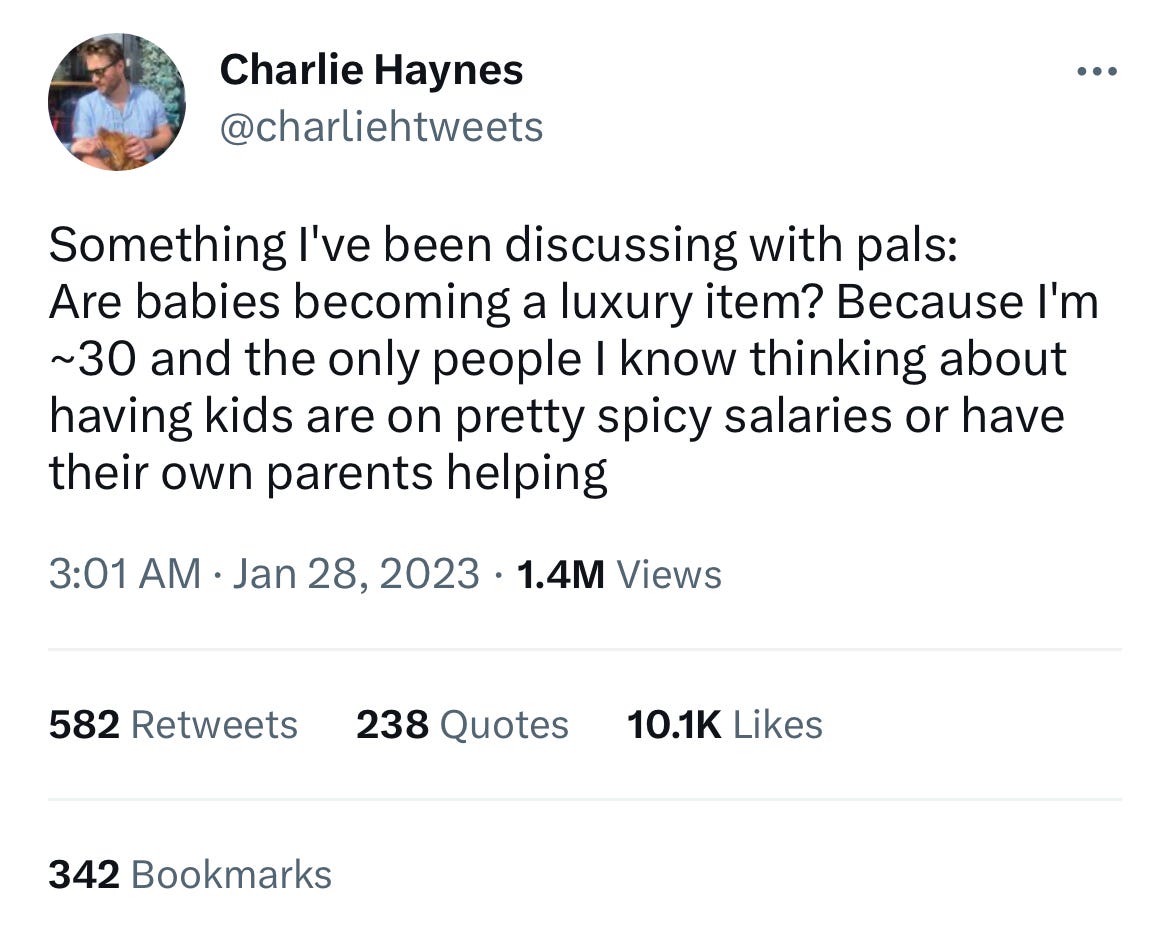I was curled up on the couch, waiting for my husband to slap his laptop shut so we could watch Succession. Our mortgage has just increased by a few hundred dollars a month, again, and like most, our safety net of savings is spiralling faster than a mother without her morning coffee. I know he is stressed. I don’t complain that it’s edging closer to the cut off time where I go to bed but instead, I scroll. His loud typing (he’s a two-index-finger type of typer) starts to fade as my eyes fixed on a post by @thecurve___, a New Zealand-based investing and finance education platform for women, and the question they posed; Are kids a luxury item? I immediately thought no, and then I saw that 60% of their audience agreed. Intrigued, I read on…
The question stemmed from a tweet (of course). A tweet by a UK reporter, Charlie Haynes, read; “Something I’ve been discussing with my pals: Are babies becoming a luxury item? Because I’m ~30 and the only people I know thinking about having kids are on pretty spicy salaries or have their own parents helping”. And a tweet that would gain more than 1.4M views since it was posted on January 28.
The comments go on to discuss how their tiny London (as far as I can tell) apartments (or ‘flats’ as the English call them) were not appropriate housing for a child, but moving to a larger residency was not an option at this point, along with the expense of childcare and the deafening ticking of the fertility clock that haunts women in their 30s, “… I feel like my time is running out.” @emmajbradshaw commented.
American author and writer Brianna Holt wrote about this very topic for vogue.com. Her feature titled; “Have Babies Become A Luxury Item?” details just how expensive it is to not only give birth in a country with no public healthcare system but to raise them, “… the expense of delivering a baby in a hospital, without insurance, and new mothers can expect, on average, to leave with a $18,865 [USD] bill.” American parents are in $30,000AUD debt before they even leave the hospital. Holt then adds, “Of course, the costs associated with having a baby only grow as the child ages. Experts estimate it costs an average of $310,000 [USD] to raise a child until age 17—an amount that exceeds the average American’s financial ability. ‘Babies just aren’t for the middle class anymore…’”
In Australia, it costs $0 to give birth in a public hospital, thanks to our public health system, Medicare. So taking the cost of birth out of the equation, how much does it cost to raise a child in Australia? According to a 2018 study by the Australian Institute Of Family Studies (the most recent study I could find), the minimum cost is $9000 AUD per year to raise a six and 10-year-old, taking into account basic expenses such as school, food, and housing. For the first four years, an article on Choice, a leading consumer advocacy group, estimates parents will spend around $8000AUD a year per child on the essentials, including childcare. It goes without saying that the cost of living has increased dramatically since 2018, and the actual cost of having a child or children rarely sits at the bare minimum and does not take into account any specialist care, not to mention the non-mandatory (but frowned upon if you don’t) activities and items parents are expected to pay for. Even frivolous items can seem very much like a necessity in the moment – who wants to have a child if they can’t afford to buy an ice-block after school on a scorching hot day?
There is no hiding or sugar-coating the cost of raising a child, especially when you factor in the rising cost of living, out of control interest rates, the rental crisis and increasing uncertainty since the pandemic – all elements which have probably contributed to the declining birth rate in Australia. A rate that has steadily declined every year since 2008. Now, this all sounds a bit bleak and financially impossible to give our children the same or a better childhood than we had – a construct we all strive for. But deciding to have a child or children is not a financial decision. There is no tangible return on investment. It’s a decision of the heart and a labour of love. Sometimes it’s not even a decision at all, especially if you’re a woman in America. That decision may be thrusted upon you whether you’re willing or not.
As far as labelling children as luxury items, it is a reckless concept. Kids are not and should not be an unobtainable item that can only be sourced by Gab Waller. It is a fundamental human right to choose to have and raise a child. A human experience that shouldn’t be based on class but the freedom of choice, and childless adults should not feel burdened by finances or fear their biological clock is running out. However, the silver lining of a conversation like this is that perhaps we are finally coming to terms with the fact that maternal and paternal welfare is everyone’s responsibility, not just parents. It’s an issue for society as a whole, and without an entire community rallying to improve public policies and infrastructures to support parents and future parents from birth and beyond then our birth rate will continue to dwindle, as will our mental health and economy, making it a very real possibility that children become as rare and expensive as a Himalaya Birkin bag.
I’d love to hear your thoughts on this topic. Please comment below.








I think the statement that children are a luxury item is coming from a western perspective of what is necessary to raise a child, and a level of privilege. Granted, cost of living and other services and goods have increased but there are many people around the world who live on a lot less than the people who make this statement and they would not view having a child as a luxury. Just that people make choices and compromises to facilitate costs for for the family. I do agree with the points made in the article, it’s just the statement that comes off as obnoxiously western in its frame of reference.
Thanks for the thought provocation Jade! Comments such as 'Kids are a luxury item' truly sadden me and in my opinion point to a failed western culture where as a society we don't place enough value on motherhood and family life. I don't disagree that having a family, and a large one at that, has financial implications, particularly in today's economic conditions. But I take issue with phrases like this being thrown around frivolously because I think it denigrates what it means to have a child, and become a parent. It is not and should not be a right of only the rich. It is a human right as you so rightly point out, and if we continue to allow people to think of children as a luxury item and a responsibility of the nuclear family only, then we will never flourish as a society. I'm quite passionate about this topic and write about it frequently. Loved reading this article of yours.